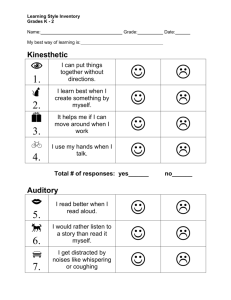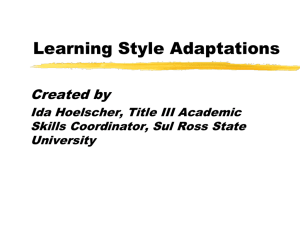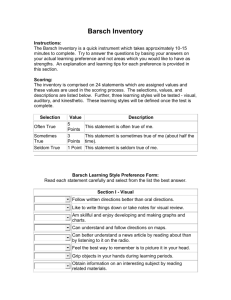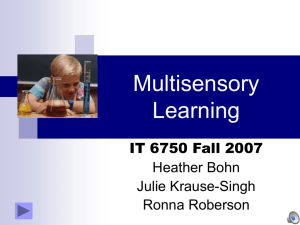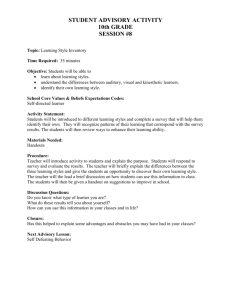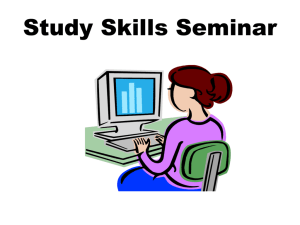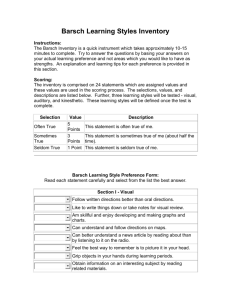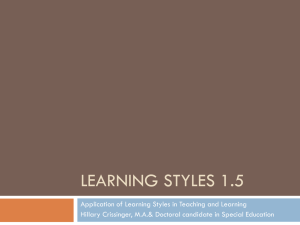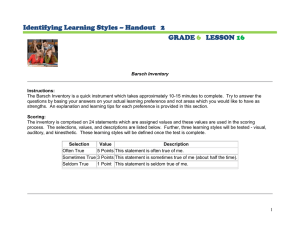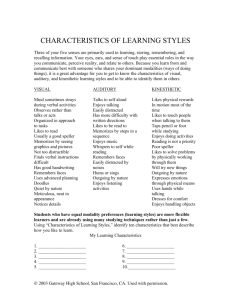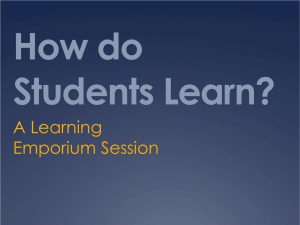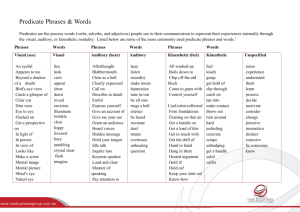Presenter Prof. DG Kulkarni Professor and Dean Department of MBA
advertisement
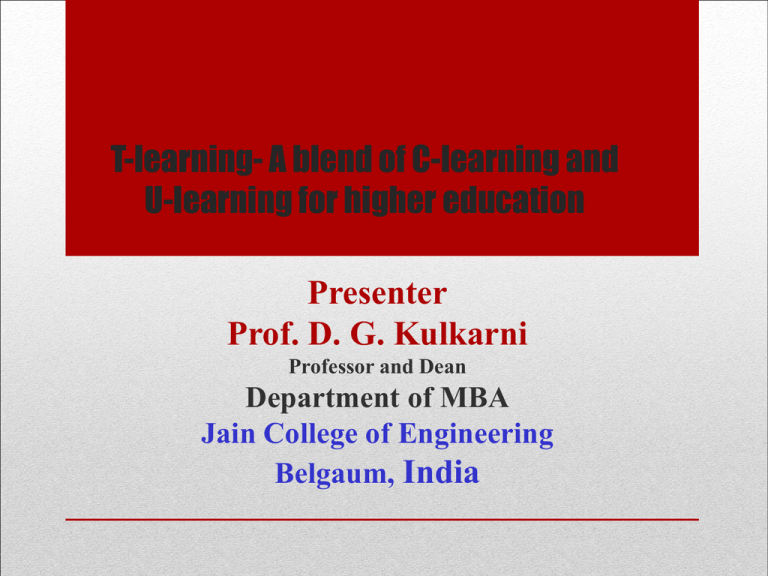
T-learning- A blend of C-learning and U-learning for higher education Presenter Prof. D. G. Kulkarni Professor and Dean Department of MBA Jain College of Engineering Belgaum, India • 1. Introduction • • • • 2. Multiple Intelligence Theory 3.Learning Styles 4.Experiment 5. Conclusion Flow of presentation • “Students who enroll in distance education courses tend to be aged 20-40, employed at least part-time, and sometimes unable to meet the entrance requirements to regular programs” [3] • Integration of high technology with multimedia tools must be emphasized because e-learning relies heavily on technologies.[1] Introduction • There is an argument that conventional learning is the best way in maintaining a learning process. Other learning methods consider it to be less efficient. Universities have a proud tradition of combining learning, research, teaching, and professional development [9]. • Some professors are afraid of their role as main instructor have been replaced by computer. This condition made them feel that they are not needed anymore in university. • M-learning has the potential of taking learning and knowledge across geographical boundaries and generations due to the fact that it can be accessed with ease. • U=M+E+ Television Learning • So far we have seen literature on the mode of delivery : e or m or u or blended ! • Are we really considering the Learners? What do they prefer? Which type of learning system has more impact? Are we giving them ‘What we have’ or Giving them ‘What they need? Lets analyse some of the learning styles that a Higher education student may have: Multiple Intelligence Theory Source: Gardner MIT-Score Card Every student has a learning style. There are three learning styles: • Visual • Auditory • Kinesthetic Learning Styles! What does it mean? Prefer to “see” Love to watch movies/ animations Prefer colors If you need to really explain to the VISUAL learner how one feels every Friday after office hours and on every Monday morning, it is advisable to show the above video: Visual Love music and sound Have keen ears Will love discussions Use “Sounds” to speak Auditory Mischievous Fidgety Cannot sit at one place for long Will love to volunteer Kinesthetic STUDENT STYLES I LOVE YOU PPT, Photos, Different Ink, refer books –see- & clear doubts. A Greeting, Rose ^^^^^^^^^^^^^^^^^ I LOVE YOU Loves to discuss, will clear doubts with friends, ask questions, argue.. ^^^^^^^^^^^^^^^^^ Will go and DO IT, test it, see models, Fidgety, etc. A Hug and a … VAK Learning Style MLearnin g Conventi onal Learning ELearning Auditory, Visual, and Kinesthetic components T-Learning concept advocates a blend of Conventional Learning, e-learning and m-learning. A little intervention of a teacher can make a great difference….. The idea of M-Learning in India floated thru a T.V. advertisement Now that the learning styles of the students are known, we have to design the instructions so that each type of student really enjoys the Knowledge Acquisition Process. For ex: The teacher can •Use Multilingual instruction •Use Videos/ Photographs for Visual students •Use Audio mode for Auditory Students •Use Simulation and Practical session for Kinesthetic Students •Have a class in a Jungle/Forest if you have Naturalist students •Avoid bugging students with Mathematics who have lower Mathematical Score … and you are the best designer of instructions! Design your Knowledge Transfer strategy 10 members(MBA students) per group, 30 days content bombarding, evaluation after one week. S.No Group Test Min.marks Max.marks Average 1 E 1 2 3 4 8 7 7 12 14 6 9 11 2 M 1 2 3 3 8 11 5 12 14 4 9 12.5 3 U 1 2 3 3 11 9 6 12 11 5 11.5 9.8 4 C 1 2 3 10 15 18 16 21 21 15 19 20 5 T 1 2 3 15 22 20 20 23 24 18 22.5 23 Experiment • It is seen that e-learning and m-learning in isolated or stand alone execution, did not fetch appreciable results in students of higher education. Students need to be motivated to learn and this element greatly abstains itself in the e-m-u- methodology. In the total learning model which proposes a content with a proper mix of e-m-u-c methods and also adhering to the content of including visual, auditory and kinesthetic modules makes learning more interesting and knowledge retention is better. This is reflected in the results of the test 2 and 3 and also in the test conducted for the T- group. The T-group who were subjected to Total Learning Model did better than the others. This implies that TLM is effective and can be practiced for other professions like medical and engineering too. Conclusion • • • • • Dr. Poornima Charantimath Dr. Kirti Shivkumar Jain Group of Institutions JNTU,Hyderbad Cogent International Acknowledgements Thank you! For you patient • HEARING ( for auditory delegates) • OBSERVATION (For visual delegates) • SEATING & NOT YAWNING ( for Kinesthetic delegates) You may contact me at +91-9448230405 kulkarnidg1@rediffmail.com info@cogentedu.com
